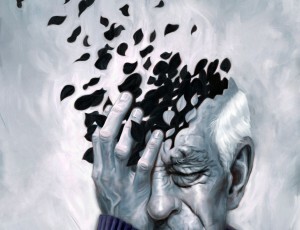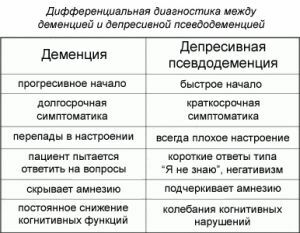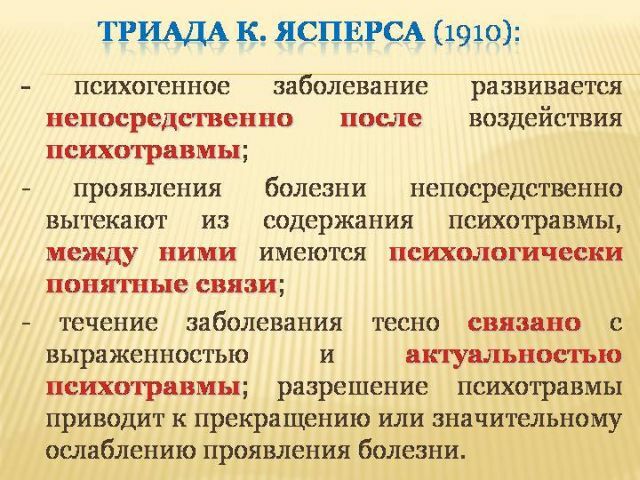 Pseudodementia is a mental disorder, which is symptomatically similar to true dementia, but it is provoked by other diseases - schizophrenia, depression, hysteria.
Pseudodementia is a mental disorder, which is symptomatically similar to true dementia, but it is provoked by other diseases - schizophrenia, depression, hysteria.
This deviation is treatable, at the first signs of the disease it is worthwhile to seek qualified help to avoid complications. It is also worth considering the fact that some types of pseudodementia can not worsen the patient's psyche and after some time his condition will recover again to normal.
What is the difference from true dementia?
Depressive pseudodementia is a mental disorder of an organic nature that has a negative impact on memory, performance and vital activity. In most cases, this condition is diagnosed in patients who are impulsive and psychologically unstable. False dementia is reversible.
With this deviation, the patient demonstrates his soreness and infirmity, trying to attract attention, therefore. Most often the disease develops after the age of 50, but there are cases when at a younger age.
Differences between dementia and pseudodementation:
- Dementia .This deviation develops gradually. Symptomatic occurs a year after the onset of the disease. Memory
 worsens gradually, the patient becomes disoriented, constantly asks for help, but there are no complaints about health. The mood changes rapidly, there are strong emotions. The patient can blame others for anything. Antidepressant therapy does not help.
worsens gradually, the patient becomes disoriented, constantly asks for help, but there are no complaints about health. The mood changes rapidly, there are strong emotions. The patient can blame others for anything. Antidepressant therapy does not help. - False dementia of the .This deviation develops rapidly. Symptoms occur less than six months later. There is a fluctuation in memory impairments. The orientation is not broken, the patient asks for help and knows where to look for it. Subjective complaints are expressed. Depression in the morning, there is a sense of guilt and despair. Antidepressant therapy helps.
Aggravating factors
This disorder of an organic nature can be triggered by various causes and circumstances that may have a negative effect on the mental state.
Psychological factors:
- a protective reaction of consciousness to a traumatic situation;
- accident;
- conflict with a relative or a close person;
- autosuggestion
- depression.
Pseudodementia can also occur in patients as a result of metabolic disorder. It is mainly diagnosed in patients who are very impulsive.
How it looks in life
The symptomatology of this disorder does not differ from the manifestations of other types of dementia. Very often the patient is not able to answer the most basic questions, it can cause him to panic or hysterics. The main and most common signs include:
- violation of mental function;
- violation of speech function;
- violation of the perception of someone else's speech;
- memory impairment until its loss.
 Also in pseudomodulation, the patient becomes more confused. This condition occurs against the background of post-traumatic cognitive and intellectual insufficiency.
Also in pseudomodulation, the patient becomes more confused. This condition occurs against the background of post-traumatic cognitive and intellectual insufficiency.
When the peak of the disease occurs, the patient has severe impairment of consciousness, which is expressed in disorientation, fears, speech disorders. There are cases when the patient is obsessed with one thought.
In the elderly, pseudodementia manifests itself in the form of severe disinhibition. The patient easily switches from one case to another, fools around, too animated, mimicry is expressed. Speech becomes confused, the thought is expressed vaguely and with errors. Excitation can increase if the patient is paying attention and making comments to him. Movement in this situation will be sharp.
But all the listed symptoms are present temporarily, after a while it is replaced by a decreased motor activity. The patient may experience depression, which will further damage the psyche. Facial expression ceases to be pronounced. With depressive pseudodegment the patient responds vaguely.
With a mild degree of disruption, the patient may confuse the names of the items or not even remember new information. There may also be a state where the patient does not confuse the names, but describes the subject according to its functionality.
Diagnostics features
In modern medicine, several criteria are used that help diagnose false dementia:
The presence of at least one characteristic sign of deviation: 
- decreased ability to think;
- reduced critical perception;
- speech impairment;
- difficulties in performing targeted actions;
- impaired perception of the surrounding world;
- violation of short-term and long-term memory
- violation of interaction with others.
To accurately say that the patient has this pathology, signs of rejection should be present for at least six months. Differential diagnostics is also mandatory.
What can I do?
In most cases, pseudodementia is treated with psychotherapy, sometimes even group therapy. Rarely, but it happens, the patient tries to overcome this deviation independently.
To prevent a mental disorder, it is necessary to establish precisely the provoking causes, therefore professional examination and diagnosis are required.
Prevention of pathology is in the following recommendations:
- a healthy lifestyle;
- avoidance of stressful situations;
- self-monitoring;
- rejection of bad habits( gambling);
- rest in the open air;
- communication with a psychologist.
After the injuries received, especially in the head area, you need to monitor the psychological state in order to exclude the violation and development of the syndrome.
 Pseudodementia may occur again, so treatment should be directed at eliminating the provoking disease. With depressive pseudodegment, the patient is prescribed antidepressants.
Pseudodementia may occur again, so treatment should be directed at eliminating the provoking disease. With depressive pseudodegment, the patient is prescribed antidepressants.
In case of pseudo-sloughing, which is accompanied by increased excitement, the patient is also prescribed neuroleptic medicines, which exert a retarding effect on a certain brain department.
At the first manifestations it is better to immediately seek help, because a professional can immediately put an accurate diagnosis and prescribe a therapy. It must be remembered that in any situation it is necessary to help the patient, to overcome this deviation.



